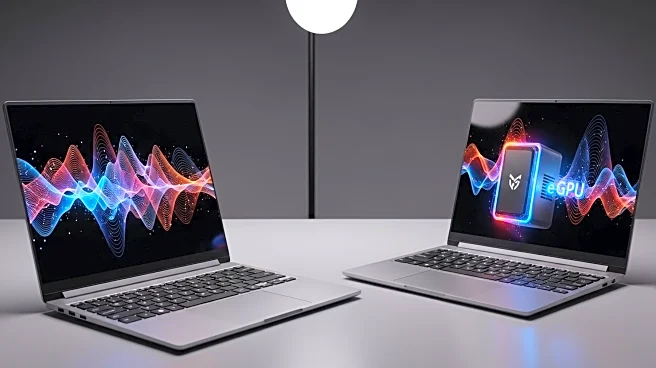What is the story about?
What's Happening?
Framework has announced the development of several new features for its second-generation Framework Laptop 16, including a giant haptic touchpad and an external graphics module (eGPU). The company aims to provide users with the ability to upgrade their Nvidia laptop graphics card at home, marking an industry first. Framework CEO Nirav Patel revealed that while some features are still in development, such as the ThinkPad Trackpoint nub, the wide haptic touchpad is actively being worked on. Additionally, Framework plans to release 3D files for users to print their own full-width palmrest for the existing touchpad. The eGPU, designed to reuse graphics modules from the Framework Laptop 16, is targeted at makers rather than everyday consumers, to avoid high costs and environmental waste.
Why It's Important?
The development of these features by Framework represents a significant advancement in laptop customization and sustainability. By enabling users to upgrade their graphics cards at home, Framework is addressing the growing demand for more flexible and environmentally friendly technology solutions. The introduction of a haptic touchpad and eGPU could set new standards in the laptop industry, encouraging other manufacturers to adopt similar practices. This move could benefit tech-savvy consumers who seek high-performance devices without the need for frequent replacements, thus reducing electronic waste.
What's Next?
Framework plans to continue refining these features, with the haptic touchpad and eGPU expected to be available for makers. The company is also working on improving manufacturing yields for its One Key Modules to offer them at reasonable prices. Future developments may include 64GB RAM modules and more durable transparent bezels. As Framework progresses, it may influence other tech companies to prioritize sustainability and user customization in their product designs.
Beyond the Headlines
Framework's approach highlights the growing trend towards modular and sustainable technology. By focusing on reusability and customization, the company is addressing both consumer needs and environmental concerns. This could lead to broader industry shifts, encouraging more companies to adopt eco-friendly practices and offer products that can be easily upgraded or modified by users.















